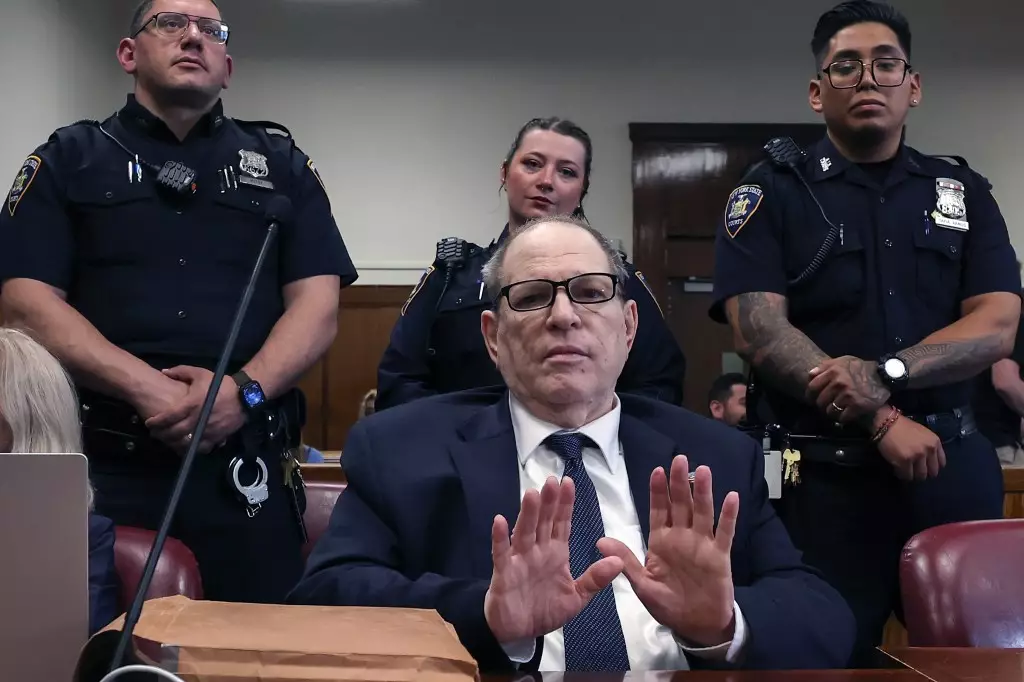Harvey Weinstein’s courtroom drama underscores a chilling reality in the realm of justice: the profoundly complex interaction between legality and morality. As Weinstein finds himself at the center of yet another rape trial, the decision rendered by his legal team to prevent him from testifying is laden with both strategic caution and haunting implications. His spokesperson, Juda Engelmayer, has framed this inclination as a form of self-preservation, arguing that taking the stand would subject Weinstein to scrutiny that extends well beyond the parameters of his current accusations. This defense strategy reflects a subtle but potent acknowledgment of the evolving societal consciousness regarding sexual assault and consent. However, one can’t help but wonder whether this approach is merely an evasion of responsibility.
Weinstein’s past aspirations to testify demonstrate a man grappling with his image, wrestling between the desire to assert his innocence and the biting reality of the evidence stacked against him. His silence can be interpreted as a defensive maneuver — a shield designed to protect him during a trial inevitably colored by the shadows of the #MeToo movement. By opting not to engage directly with the jury in a courtroom that has become emblematic of his alleged misconduct, Weinstein quietly reinforces the idea that he remains a figure of notoriety, shielded from accountability by his own fear of the consequences.
Public Perception and PR Strategy
Furthermore, while courtroom procedures remain ostensibly silent, Weinstein has embarked on a guerrilla publicity campaign. In a recent television interview with Candace Owens, a controversial figure known for her divisive opinions, Weinstein proclaimed his innocence with an almost desperate fervor. His insistence on being “wrongfully accused” appears to resonate with certain segments of the public, eager to engage with narratives that challenge the well-documented testimonies of his accusers. In these moments, Weinstein is not merely a defendant; he assumes the role of a martyr in his own tragic saga, shifting the focus from accountability to victimhood.
The strategic positioning of a self-proclaimed victim deflects scrutiny and subtly re-victimizes those he has allegedly harmed. It calls into question not only Weinstein’s accountability but also the societal tendency to be captivated by the stories of men, even those with numerous allegations against them. Although Weinstein’s claims evoke immediate sympathy from some, they reveal a disturbing truth: that narratives about victims often receive far less attention compared to the carefully crafted image of the accused.
Legal Intricacies and Political Machinations
The layers of complexity within Weinstein’s trial exemplify the oft-turbulent nexus between the judicial process and the political landscape. With the original 2020 conviction overturned amid shady legal maneuvering, one cannot ignore the implications of such decisions in an era striving for progress in the treatment of sexual assault cases. The introduction of new counts and changes in the presiding judge illustrate not only a fluid judicial system but also how privilege and power can play decisive roles in navigating the labyrinthine corridors of justice.
This is a critical juncture for the American legal system, as it once again grapples with the seismic cultural shifts brought on by the #MeToo movement. Each trial and hearing serve not only as a battleground for Weinstein’s alleged crimes but also as a litmus test for society’s commitment to confronting, dismantling, and eliminating systemic misogyny. The fact that Weinstein could potentially face life in prison for offenses amid ongoing appeals and complex legal arguments is an unfortunate reminder of the precarious nature of justice — especially for those who have gone unheard.
A Society at the Crossroads
As Weinstein’s fate oscillates like a pendulum between the weight of collective outrage and the cold mechanics of legal protocol, we are reminded of the stark dichotomy of accountability versus impunity. The theater of his trial and the silent weight of his choices serve as microcosms of the greater existential questions surrounding sexual ethics in our society. Are we moving toward a future that robustly addresses the complexities of consent and perpetration, or do the powerful and privileged continue to dance within a realm unbound by the same rules?
In this poignant moment, positioned precariously at the intersection of legal proceedings and public opinion, Harvey Weinstein’s silence speaks volumes. It echoes the fears that many share regarding the intricacies of truth, power, and justice, leaving us to ponder deeply about the repercussions not only on individual lives but the very fabric of societal ethics.


Leave a Reply